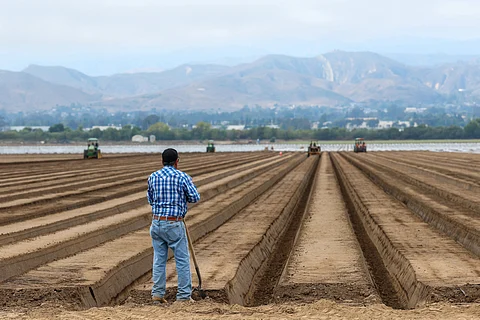
- NEWS
- the EDIT
- COMMENTARY
- BUSINESS
- LIFE
- SHOW
- ACTION
- GLOBAL GOALS
- SNAPS
- DYARYO TIRADA
- MORE

VENTURA, United States (AFP) — Lisa Tate, whose family has been farming in Ventura County since 1876, cannot recall a threat to crops like the one emanating from Donald Trump's anti-immigrant onslaught.
Tate fears that the crackdown on illegal workers, far from addressing the problems of this vital agricultural region north of Los Angeles, could "dismantle the whole economy" and put the country's food security at risk.
"I began to get really concerned when we saw a group of border control agents come up to the Central Valley and just start going onto farms and just kind of trying to chase people down, evading the property owner," the 46-year-old farmer, who grows avocados, citrus and coffee, told Agence France-Presse (AFP) in an interview.
"That's not something we're used to happening in agriculture," she added.
The impact goes beyond harvesters, she said. "There's a whole food chain involved," from field workers to truck drivers to people working in packing houses and in sales.
"It's just, everybody's scared," she said — even a multi-generational American like her.
"I'm nervous and I'm scared, because we're feeling like we're being attacked."
Other farmers contacted by AFP declined to speak to the media, saying they feared potential reprisals from the Trump administration.
Worker shortages
The agricultural sector has for years been trying to find permanent solutions for its perennial labor shortages, beyond issuing temporary permits for migrant workers.
"Some of the work we have is seasonal. But really, around here, we need workers that are year-round," Tate says.
The number of government certified positions for temporary agricultural workers practically tripled between 2014 and 2024, Department of Labor statistics show, underlining just how much American agriculture depends on foreign workers.
On top of that, some 42 percent of farm workers are not authorized to work in the United States (US), according to a 2022 study by the Department of Agriculture.
Those numbers line up with the struggles many farmers go through to find labor.
They say US citizens are not interested in the physically demanding work, with its long days under extreme temperatures, rain and sun.
Against that backdrop, Tate warns that removing people who are actually doing the work will cause immeasurable damage.
Not only will it harm farms and ranches, which could take years to recover, it will also send food prices soaring, and even endanger US food security, possibly requiring the country to start importing provisions that may previously have been grown at home, she says.
"What we really need is some legislation that has the type of program that we need, and that works for both the workers, that ensures their safety, it ensures a fair playing field when it comes to international trade, as well as as domestic needs," Tate said.
